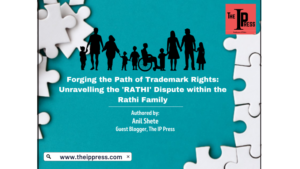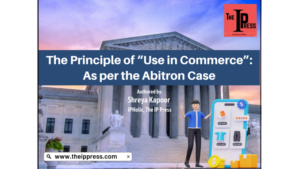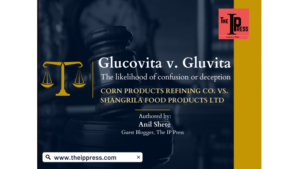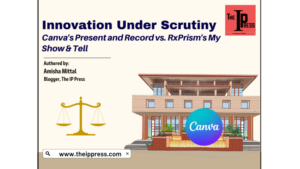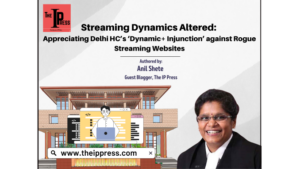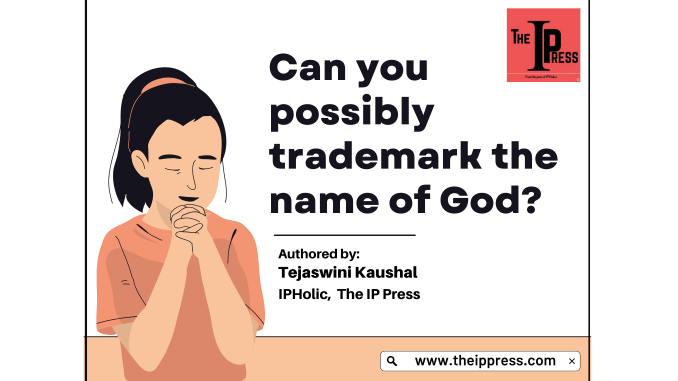

Hmm…. Sounds like Blasphemy
While the world of IPR is not exactly rid of complications and controversies, something that can truly ignite fires in this domain might be: Can you possibly trademark the name of God?
Legally speaking, Section 9(2)(b) of the Trade Marks Act, 1999, addressing absolute grounds for refusing registration, prohibits the registration of a trademark if it includes elements likely to offend the religious sensitivities of any segment of Indian citizens. When a trademark incorporates the name of God, it restricts normal individuals and devotees from using that divine name. This provision aims to prevent the commercialization of religious symbols, as outlined in Article 25 of the Constitution of India, which safeguards against exclusive rights that may hinder others from utilizing the same. The Act also extends its prohibition to personal names such as those of Lord Buddha, the Sikh gurus, etc., asserting that trademark registrations causing religious discomfort objectify sacred symbols and titles. This stance aligns with the belief that names of public deities, existing in the public domain, should not be monopolized as intellectual property, as it not only offends religious sentiments but also obstructs devotees from freely invoking the name of God.
This piece analyzes whether the name of God can legitimately be trademarked by proprietors, considering judicial decisions on this matter. It further delves into the question of whether proprietors should choose to pursue such a trademark, even though it is technically possible.
Keeping Names of Gods in Trademarks: Bad Idea, Right?
The deliberation on whether trademarking God’s name is allowed has come into place through a series of cases over the years. The court’s stance has predominantly leaned towards refusing to grant the trademark, evident in the forthcoming discussion. In the Mangalore Ganesh Beedi Works v. District Judge, Munsif City (2005) before the Allahabad High Court, the respondent objected to the use of the trademark “Ganesh” on beedis, citing religious concerns related to smoking and disposal of the beedi packets. The court dismissed the argument, stating that no evidence suggested smoking hurt religious susceptibilities, drawing a parallel with the common practice of discarding invitation cards with images of deities after use. This decision showcased a progressive interpretation of the trademark act.
In another case decided by the Delhi High Court, Kewal Krishan Kumar vs Rudi Roller Flour Mills (P) Ltd. (2007), the dispute centered around the question of whether one could monopolize the term “Shiv Shakti.” The appellant traded under the registered mark “Shakti Bhog” since 1982, dealing with the sale of atta, maida, and suji. Meanwhile, the respondent sought registration for the mark “Shiv Shakti” accompanied by a ‘Trishul’ and ‘Damru’ device. The Court determined that “Shiv Shakti” is phonetically distinct from “Shakti Bhog Atta,” emphasizing that while ‘Shakti’ is common, it is merely descriptive of strength and power. The distinct features of “Shiv” and “Bhog” in the two marks make confusion unlikely. Furthermore, the Court emphasized that there cannot be a monopoly over the descriptive word “Shakti.”
In Praveen Raj v Controller General of Patents, Designs and Trademarks (2009) the High Court of Kerala permitted a temple trust to register a trademark featuring an image of the Attukal deity. The court clarified that this registration wouldn’t impede the devotees’ right to worship. However, it acknowledged the trust’s authority to prevent others from offering services under the deity’s name for financial gain.
In Bhole Baba Milk Food Industries Limited Versus Parul Food Specialities (P) Limited (2011) the Plaintiff, a milk and dairy products manufacturer, had been using the ‘KRISHNA’ mark since 1992. The Defendant filed for the trademark ‘Parul’s Lord Krishna’ in 2009. The Delhi High Court, applying a test of secondary distinctiveness, found the common name ‘KRISHNA’ lacked the necessary distinctiveness for the Plaintiff. The Court noted the Defendant’s use of prefixes like “Parul’s” and “Lord” showed no dishonest intention. The Court emphasized that descriptive marks, especially combinations of common words, may not be entitled to monopoly. The Court allowed the Defendant to use their label mark, specifying the font size and prominence for the prefixes “Parul’s” and “Lord” in relation to ‘KRISHNA’. The Supreme Court, in its decision, referred to the Eighth Report on the Trade Marks Bill, 1993, where the Parliamentary Standing Committee discouraged the registration of symbols related to Gods, Goddesses, and places of worship as trademarks.
Subsequently, in Lal Babu Priyadarshi vs. Amritpal Singh (2015), the Supreme Court addressed the registration of names of holy books as trademarks. The appellant sought registration for the mark “Ramayan” with a crown device for incense sticks and perfumeries. The respondent argued against exclusivity, asserting that a single trader couldn’t claim rights over a religious book’s name. The court decisively ruled that using the name of a holy or religious book as a trademark is not permissible. However, it noted that if a prefix or suffix altered the word’s length, it might be considered for registration. The denial of registration in this case was also based on the loss of distinctiveness and evidence of multiple traders using the term ‘Ramayan’ for similar goods. However, this judgment’s suggestion of a broader prohibition on registering holy or religious book names as trademarks is unclear for its origin. The current judgment, in contrast to the Supreme Court’s view in the 2005 case mentioned earlier, implies that asserting exclusivity over a religious book’s name could potentially ‘hurt religious susceptibilities.’ The perspective presented in this case overlooks the potential avenue of common law rights through passing off, offering an alternative to exclusivity through registration.
However, a recent divergence from this stance occurred when the Madras High Court in Durga Dairy Ltd vs M/S. Sri Shakthi Dairy Products (2017)allowed the protection of the name “DURGA” through registration, considering “JAI DURGA” phonetically similar and eligible for protection. However, in the Bombay High Court case of Freudenberg Gala Household Product Pvt. Ltd (Gala) v. GEBI Products (Gebi) (2017), the dispute centered on Gala’s use of the trademark “LAXMI” for brooms. Despite the name being associated with a Hindu goddess, Gala obtained registration for it as a “label.” Gebi adopted “MAHA LAXMI” for brooms, another name for the same goddess. Surprisingly, the court ruled in favor of Gebi, clarifying that Gala’s registered label did not grant exclusive rights over individual words. It emphasized that the use of gods’ names is not exclusive, preventing a single party from monopolizing such words. This case highlighted the distinction between protecting a label mark and claiming a monopoly over a common word, particularly a god’s name.
Most recently, however, the pendulum has swung both ways in the case of Shyam Steel Industries Limited v. Shyam SEL and Power Limited and Another (2020), where the Calcutta High Court ruled that there is no absolute bar on registering a god’s name as a trademark, yet refused to grant one even in this case. Here, the Appellant sought an interim injunction against the respondents for using the mark “SHYAM” in the manufacturing of TMT bars. The Respondents contended that “SHYAM” referred to the Hindu deity Lord Krishna, not just a person or name. However, the Court rejected this argument, emphasizing the Respondents’ need to substantiate the claim with compelling evidence, which the Defendants failed to prove. The court allowed the Appellant’s interim injunction application.
Considerations for the Future: Staying Safe from the God’s Wrath
Usually, for a trademark used for a particular brand of goods or services to be granted has to acquire secondary distinctiveness in its respective consumer market. This flows from the proviso of Section 9(1) of the Trade Marks Act, which stipulates that a mark should not be denied registration if, prior to the application date, it has gained a distinctive character through its usage or is recognized as a well-known mark. The trademark may get registered, depending on other legal factors as well as on the fact that it has acquired distinctiveness due to the long use in its respective consumer market. In light of this, whether the names of Gods, being common personal names, should be treated differently under trademark law?
The distinction between gods’ names and common personal names in terms of uniqueness is question needing answers. While registration as label or device marks can address distinctiveness concerns, registering them as word marks is suitably to be refused, but there still remains high ambiguity on whether all names of gods, given an even greater range and extensive variety of other demigods, demons, creatures, saints, kings that originate from our Holy Books, should be deemed as inherently common and thereby excluded from exclusivity.
Evidently, although allowed, the strength of trademarks featuring names of gods remains ambiguous.. Exclusive statutory rights over such words cannot be claimed, making enforcement a formidable challenge in the realm of trademarks associated with the names of gods. Enforcing trademarks that incorporate the names of gods presents inherent challenges, particularly in India, where such names are commonly used in diverse businesses, whether officially registered or not. An easy approval of such trademarks also raises concerns about how many widely recognized images in the public domain might obtain exclusive rights in the hands of proprietors. In conclusion, proprietors might want to rethink their brand names as trademarks to rather be safe than sorry!
- SEO Powered Content & PR Distribution. Get Amplified Today.
- PlatoData.Network Vertical Generative Ai. Empower Yourself. Access Here.
- PlatoAiStream. Web3 Intelligence. Knowledge Amplified. Access Here.
- PlatoESG. Carbon, CleanTech, Energy, Environment, Solar, Waste Management. Access Here.
- PlatoHealth. Biotech and Clinical Trials Intelligence. Access Here.
- Source: https://www.theippress.com/2024/01/29/in-the-name-of-god-scrutinising-whether-gods-name-can-be-trademarked-hmm-sounds-like-blasphemy/
- :has
- :is
- :not
- :where
- ][p
- 1
- 14
- 2005
- 2011
- 2015
- 2017
- 2020
- a
- About
- Absolute
- accompanied
- acknowledged
- acquire
- acquired
- Act
- address
- addressed
- addressing
- adopted
- After
- against
- aims
- Aligns
- All
- allowed
- also
- altered
- alternative
- Although
- Ambiguity
- an
- analyzes
- and
- Another
- answers
- any
- Application
- Applying
- approval
- ARE
- argued
- argument
- around
- AS
- Asserting
- associated
- authority
- Avenue
- b
- Bad
- bar
- bars
- based
- BE
- been
- before
- being
- belief
- between
- Bill
- Blog
- book
- Books
- both
- brand
- broader
- businesses
- but
- by
- CAN
- cannot
- Cards
- case
- cases
- causing
- centered
- challenge
- challenges
- character
- Choose
- citing
- Citizens
- claim
- claimed
- claiming
- clarified
- combinations
- come
- commercialization
- committee
- Common
- commonly
- compelling
- complications
- Concerns
- conclusion
- confusion
- considered
- considering
- consumer
- consumer market
- contrast
- controller
- could
- Court
- creatures
- Crown
- Current
- dairy
- Date
- dealing
- decided
- decision
- decisions
- deemed
- defendants
- Delhi
- delves
- Depending
- designs
- Despite
- determined
- device
- DID
- differently
- discouraged
- discussion
- dishonest
- disposal
- Dispute
- distinct
- distinction
- distinctive
- district
- Divergence
- diverse
- domain
- drawing
- due
- Earlier
- easy
- Eighth
- elements
- eligible
- emphasized
- emphasizing
- enforcement
- enforcing
- entitled
- especially
- etc
- Even
- evidence
- evident
- exactly
- excluded
- Exclusive
- exclusivity
- existing
- extends
- extensive
- fact
- factors
- Failed
- favor
- Features
- Featuring
- filed
- financial
- fires
- Flows
- food
- For
- formidable
- forthcoming
- found
- freely
- from
- further
- Furthermore
- future
- Gain
- gained
- Gala
- General
- get
- given
- God
- Goddess
- GODS
- goods
- grant
- granted
- greater
- had
- Hands
- here
- High
- Highlighted
- hinder
- Hindu
- household
- How
- However
- HTML
- HTTPS
- Hurt
- idea
- if
- Ignite
- image
- images
- in
- includes
- incorporate
- incorporates
- india
- Indian
- individual
- individuals
- industries
- inherent
- inherently
- intellectual
- intellectual property
- Intention
- interim
- interpretation
- into
- invitation
- IP
- IT
- ITS
- judge
- judicial
- just
- kumar
- Label
- Law
- Legal
- Length
- light
- like
- likely
- Limited
- Long
- loss
- Ltd
- make
- Making
- Manufacturer
- manufacturing
- many
- mark
- Market
- Matter
- May..
- Meanwhile
- mentioned
- merely
- might
- Milk
- mills
- multiple
- name
- names
- necessary
- Need
- needing
- no
- normal
- noted
- obtain
- obtained
- occurred
- of
- off
- offering
- Officially
- on
- ONE
- only
- or
- Origin
- Other
- Others
- our
- outlined
- over
- packets
- Parallel
- Parliamentary
- particular
- particularly
- party
- Passing
- Patents
- person
- personal
- perspective
- piece
- Place
- Places
- plato
- Plato Data Intelligence
- PlatoData
- possible
- possibly
- posters
- potential
- potentially
- power
- practice
- predominantly
- presented
- presents
- press
- prevent
- preventing
- Prior
- Product
- Products
- progressive
- Prohibition
- prominence
- property
- protecting
- protection
- Prove
- provision
- public
- pursue
- question
- raises
- range
- rather
- realm
- recent
- recently
- recognized
- referred
- refusing
- register
- registered
- registering
- Registration
- Rejected..
- related
- relation
- remains
- report
- respective
- respondents
- Rid
- right
- rights
- ruled
- safe
- safeguards
- sale
- same
- SCI
- secondary
- segment
- sentiments
- Series
- Services
- should
- showcased
- showed
- similar
- since
- single
- Size
- Smoking
- something
- sought
- sounds
- speaking
- stance
- standing
- stating
- staying
- steel
- Still
- strength
- such
- Supreme
- Supreme Court
- technically
- term
- terms
- test
- than
- that
- The
- The Future
- the world
- their
- Them
- There.
- thereby
- this
- those
- though?
- Through
- titles
- to
- towards
- trade
- traded
- trademark
- trademarked
- trademarks
- trader
- Traders
- treated
- truly
- Trust
- two
- unclear
- under
- uniqueness
- unlikely
- Usage
- use
- used
- using
- Utilizing
- variety
- Versus
- View
- vs
- want
- was
- ways
- WELL
- well-known
- when
- whether
- which
- while
- widely
- with
- Word
- words
- works
- world
- years
- yet
- you
- zephyrnet


